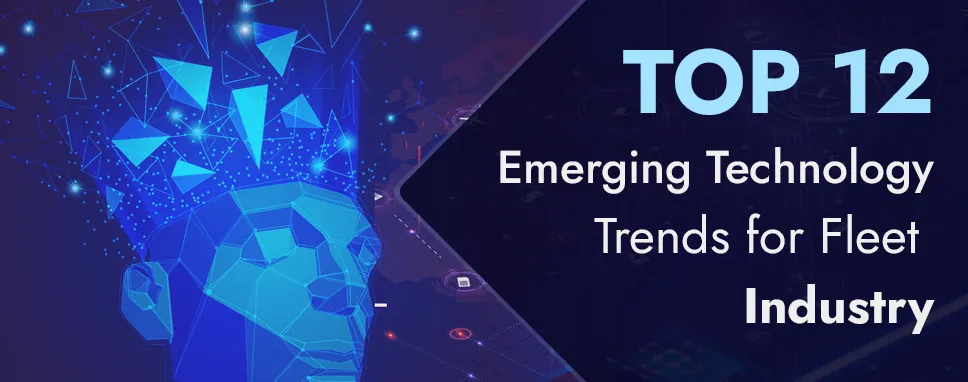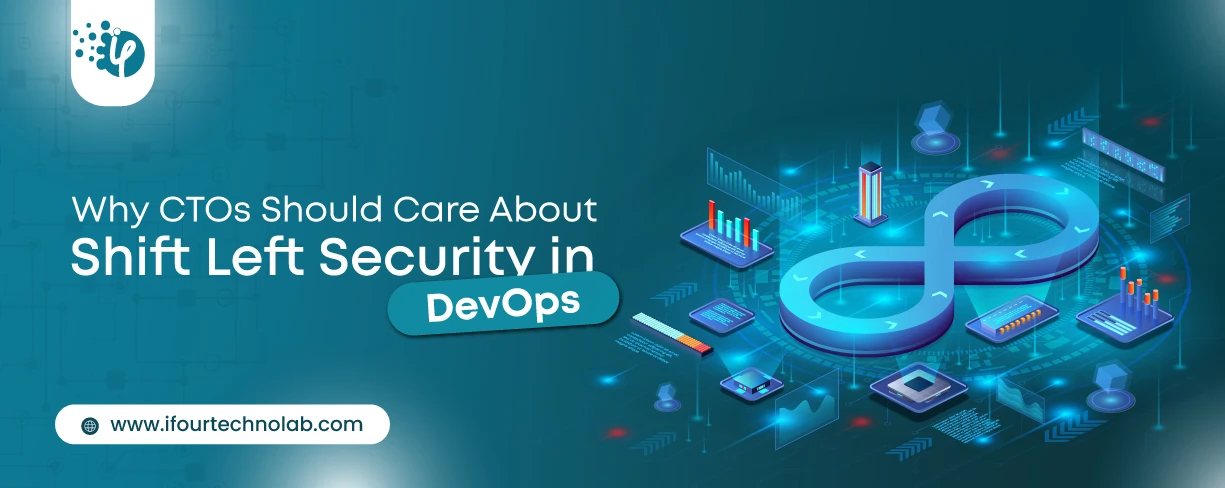Top Shift Left security Best Practices CTOs should consider
According to HackerOne, fixing a security issue after software is released can cost 30 times more than fixing it during development. Today, CTOs take a different approach. Shift...
Listening is fun too.
Straighten your back and cherish with coffee - PLAY !

Like most others, the Fleet industry is also one of the significant units of aNation’s economic system. It is the main pillar for most businesses today that handles the needs of transportation for successful tradingboth locally and internationally.
Transportation has become a common requirement for every businessthese days to handle logistics and streamline the processes.If you are a manager or an owner of the Fleet industry, you need to keep a close lookat the technological trends and transformations that would impact the industry. These trends would help you in improving industrial efficiency and minimize expenses.
Here, we have listed the top technology trends for the fleet industry that would help you to stay updated and steady for the future.
“Working smarter, not harder, will be a key theme for businesses in 2021.Today, working smarter means giving the mobile assets vital to your business a voice, so they’re able to give you the insight, the intelligence at the edge, you need to make the right decisions every time. In 2021 and beyond, working smarter will mean offloading some of those decisions to the assets themselves because they have the voice to communicate with one another by leveraging Intelligent Telematics Solutions, such as CalAmp’sEdgeCore Platform. More unified SaaS-based mobile platforms will streamline fleet operations and asset visibility to drive greater efficiencies in transportation, shipping and logistics. Greater insights into mixed-asset utilization will improve operational performance and increase workforce productivity. More contextual and integrated insights into driver behavior and vehicle diagnostics will improve driver and road safety, minimize unscheduled downtime and extend vehicle lifecycle with preventative maintenance.”
- Jeff Clark, Senior Vice President of Product Management from CalAmp
“President-elect Joe Biden has been very forthcoming in his support for EVs to be the future of transportation. With goals to create one million new jobs in the auto sector and to position America to be the global leader in the manufacture of electric vehicles and their input materials and parts. Biden among states like California and New Jersey aim to ensure that every vehicle on the road is zero-emission by 2040.”
- Alf Poor, CEO of Ideanomics
“Undoubtedly big data is the trend to watch for fleet operators. The value of customer/user data has become a valuable passive revenue stream for an industry with high overheads and obsolescence rates. But companies need to pay special attention to regulatory compliance, which has become increasingly protective of consumer data and is finally beginning to levy significant fines for breaches and non-compliance.
Privacy and data security attorney Peter Cassat is the former General Counsel for Cox Automotive and advises clients in the fleet and auto industries on the value and regulatory burden of monetizing their data.”
- Susannah Taylor from DJD/Golden
Technology has become an integral part of the way we do business, it can be said that the jump to 5G technology will have an impact bigger than anything to come along in a decade. Morneau, CEO of inBeat Agency says that with the expansion of the 5G network, it enables self-driving cars to make “split-second” decisions, making them safer. These cars can also connect to street lights, other cars, and even respond to any traffic issues.
Some of the biggest benefits of adopting 5G network is - the fleet managers would have rapid and instant access to the real-time data of the fleet such as fleet conditions, stopovers, location, route efficiency, driver’s behaviour, fuel utilization, road blockages, etc. allwith the help of sensor communication and telematics.
According to the report of Frost and Sullivan, GPS fleet management system can diminish the fuel consumption by 20-25 %, lower the idle time by 20-30%, raise the productivity by 10-15% and decreases mile driven. David Morneau from inBeat Agency further adds that growth of Telematics & GPS Tracking andtelematics helps fleet managers determine diagnostics levels in real-time.From a customizable dashboard, fleet operators can see where their drivers are in real-time, the health of their vehicles, and make sure their employees are driving safely.
Just as the way Spotify and Netflix offer effortless access to numerous TV shows and channels, Mobile as a service (MaaS) would provide magnificent access to the wide array of transport options around the cities and boundaries. Some of the examples of MaaS are Uber, Ola, Flexicar, etc. David Morneau from inBeat Agencyalso believes that market researchers claim that MaaS is indeed a massive opportunity with high growth potential. The Mobility as a Service (MaaS) market will register a 33.8% CAGR in terms of revenue.
“The fleet industry will continue its transformation in 2021, with further penetration of tech solutions that automate and optimize the different tasks and processes of transportation, fleet and cargo services across land, sea and air.
A very interesting trend that will go mainstream in the fleet industry is the use of AI to take care of bureaucracy and pen and paper processes. Fleet services must undergo a lot of steps that involve paperwork and human interaction (think customs, inventory checks, etc). These processes currently involve paper forms and documentation, and lots of people checking the information accuracy. Five years from now this will be done entirely by AI, and in 2021 we will see the first wave of strong adoption of these solutions. In Mudango we are deploying our first pilot of this type of technology, through a partnership with a traditional blue-chip logistics and port operator.
In addition, the adoption of mobile technologies that we've seen in the sector since 2015 will continue to drive the implementation of more automation and more control in the sector. This will increase transparency and visibility for users, who increasingly demand the same level of easiness in fleet services vs what they get from Netflix, Uber Eats or Instagram.”
- Andres Ossa, Co-founder and CTO of Mudango
Data is always being a critical part ofindustrial operations and management. Therefore, keeping an attentive eye on the technologies that collect and transmit the data and safeguarding them is much necessary. Perhaps you have seen so many cases of data breachesin the fleet industries. To overcome such concerns, ensuring if your fleet premises are working with a telematics provider for enhancing security would make great sense.
Protect your Fleet industry with the assistance of a reputable telematics service provider rather than an unknown company.
When you are in a Fleet business, lots of burden would be on your shoulder, especially the security of goods. To get rid of the trust issues, industries should adopt video analytics. It would help you to monitor the health and behaviour of the driverand eventually reduces accidents.Not just that, you can also keep an eye on unnecessary fuel consumption.To install Video analytics, industries would require some significant equipment such as IP cameras, onboard computers, GPS, internet, accelerometer, etc.
ADAS is a kind of AI-based software system that is installed in the vehicle to provide outstanding assistance to the drivers in various ways.It ensures safety by signifying danger alerts related to traffic and pedestrians.It minimizes collisions and helps in reducing energy consumption.
Apart from that, the owners can also identify the driver’s behavioras well as different environmental conditionsto make essential adjustments.
One of the trends most companies are following with the Fleet industry is the implementation of Radio frequency identification tags.You can easily track these tags using radio waves and can be used with inventory and company assets. With continuous improvement in technology, RFID tags have become cost-effective and reasonable in the market. The best part of adopting these tags is - you can reduce the loss of goods, assets, and pilferage activities.
Fleet KPIs are used to accelerate the business operations and guides you with fine decisions to improve your fleet business. It helps in translating the telematics data into essential objectives like productivity, risk mitigation, profitability, customer service, etc.
With theKey Performance Indicators (KPI), you can efficiently determine the effectiveness of your fleet management strategy. It boosts efficiency and recognizes the effects of risky driving behaviour on business safety, and risk scores.
Technology in the Fleet industry would play a crucial role in eliminating complexities and risk of security associated with goods. With the advancement in technology comes stiff competition, and it has become an ultimate need to stay updated with the trends. We have discussed the top technology trends that could impact the standard of the Fleet industry.Integrating the above-discussed solutions would help your fleet business with greater operational success.

According to HackerOne, fixing a security issue after software is released can cost 30 times more than fixing it during development. Today, CTOs take a different approach. Shift...

A few years ago, companies built software first and thought about security later. Developers and security teams did not cooperate, and problems were fixed only after release. This activated DevSecOps vulnerabilities and many DevSecOps failures.

Security has always been a major concern. Your company spends millions on cybersecurity tools, and guess what? You’re still vulnerable. When you're working in the cloud, especially...